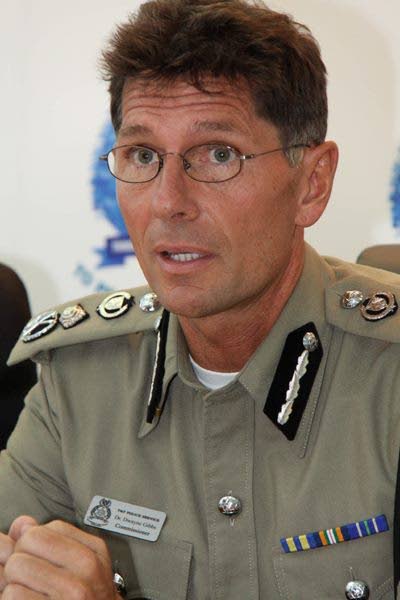Ex-CoP Gibbs: I would never have authorised 2011 SoE

While he was not in TT when the 2011 state of emergency (SoE) was declared, commissioner of police at the time Dr Dwayne Gibbs said it was not something he would have implemented if he had been in the country or had the authority to do so.
Gibbs, a former superintendent of the Edmonton Police Service in Canada, and fellow Canadian Jack Ewatski were appointed TT's police commissioner and Deputy Commissioner of Police (DCP) respectively in 2010. They resigned in July 2012.
Newsday e-mailed nine questions to Gibbs on Monday on his thoughts on the effectiveness and rationale behind the state of emergency of a decade ago. He declined to answer four.
These questions were related to rumours of an impending drug war between Colombian and Mexican drug cartels in TT; intelligence on the purported plot to assassinate then Prime Minister Kamla Persad-Bissessar; and what intelligence was used that led to the arrest of hundreds of citizens.
The SoE was announced on August 21, 2011, while Gibbs was in Brazil, attending the signing of a memorandum of understanding on drug interdiction and a sharing-of-information policy.
Gibbs said the government of the time was considering introducing an SoE well before August, which he also opposed.
"I attended the Prime Minister's Joint Intelligence Committee meeting, where I was apprised that the Prime Minister and ministers were seriously considering implementing an SoE.
"I firmly suggested at that meeting that locking-down and implementing curfews in TT during Carnival, when hundreds of thousands of people were arriving in the country to celebrate, could devastate TT's tourist economy and that I had assigned dedicated officers (months previously) to develop strategies and operational plans for the policing of Carnival 2011; including contingency operational plans with the military should there be unexpected outbreaks of violence or riots."
Citing the 2010 lockdown of Tivoli Gardens, Jamaica, where police trying to arrest drug trafficker Christopher "Dudus" Coke battled gang members, resulting in the deaths of 70 civilians, Gibbs said he wanted to avoid this.
In addition to an earlier date for the SoE, Gibbs said another suggestion made by the committee and the then Prime Minister was the introduction of a "flying squad," something he was also hesitant over.
"The Prime Minister and ministers of the Joint Intelligence Committee also believed that there should have been implemented: a 'Flying crew,' to quell the violence in TT. Note this was done 'illegally' by a previous TT commissioner of police with very negative consequences."
Gibbs was referring to former CoP Randolph Burroughs, who was eventually fired and charged with conspiracy to murder.
On the SoE, Gibbs maintained he disagreed with it.
"The SoE was declared by the TT Government in my absence from the country. If it had been within my authority, an SoE would not have been implemented."
On his return from the conference, Gibbs said he met with the heads of the protective services and set up an operational centre at police headquarters in Port of Spain where exercises and activities could be co-ordinated.
Responding to questions on the "hotspot zones" that were identified, he said, "Policing efforts/operations/arrests were conducted according to the information and intelligence that was gathered and analysed by police and military officers during the SoE in consultation with lawyers contracted out through the Attorney General's department."
On whether he felt the SoE achieved its goals in disrupting criminal activities, Gibbs said his personal goal for the police was a transformation in function and training, which he said was already yielding results at the time.
"At the beginning of 2011 my strategic plan was beginning to be rolled out and implemented.
"Up until the SoE in August, small inroads in the improvement in the way the police were being recruited and trained, and how they were performing their operational activities with the public, showed very positive reductions in murders and overall crime ie, over 25 per cent reduction in murders, and approximately the same 25 per cent reduction in crime from the previous year.
"The SoE, with its lockdowns and curfews saw the statistics maintained until the end of the year (the SoE improved on them ever so slightly)."
The SoE ended in December that year.
Gibbs said his main objective as commissioner was to introduce the concept of 21st-century policing to local authorities, which would include professional, community-oriented activities while including "intelligence-led" operations against criminals. He wanted to see police out patrolling rather than being based in stations for the majority of their hours on duty.


Comments
"Ex-CoP Gibbs: I would never have authorised 2011 SoE"